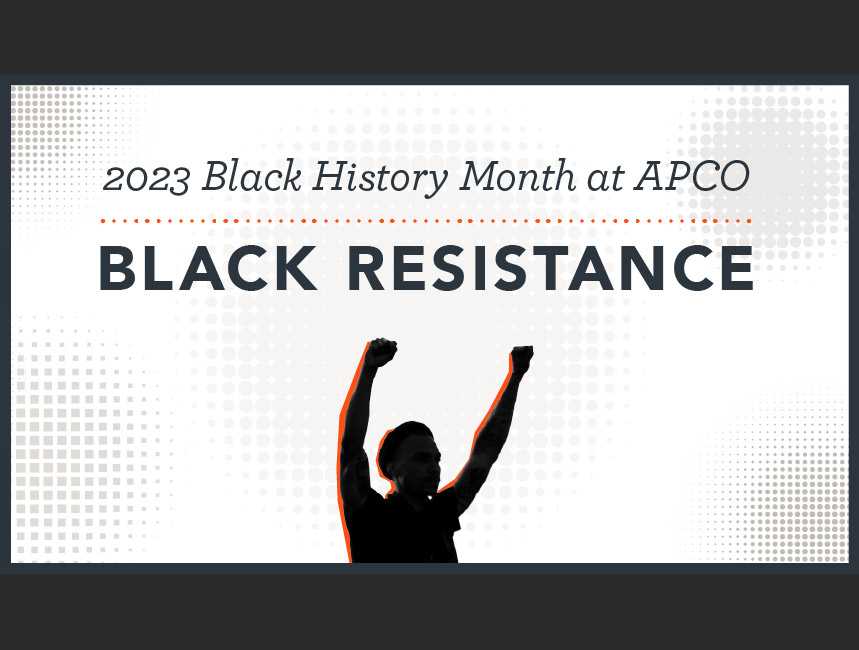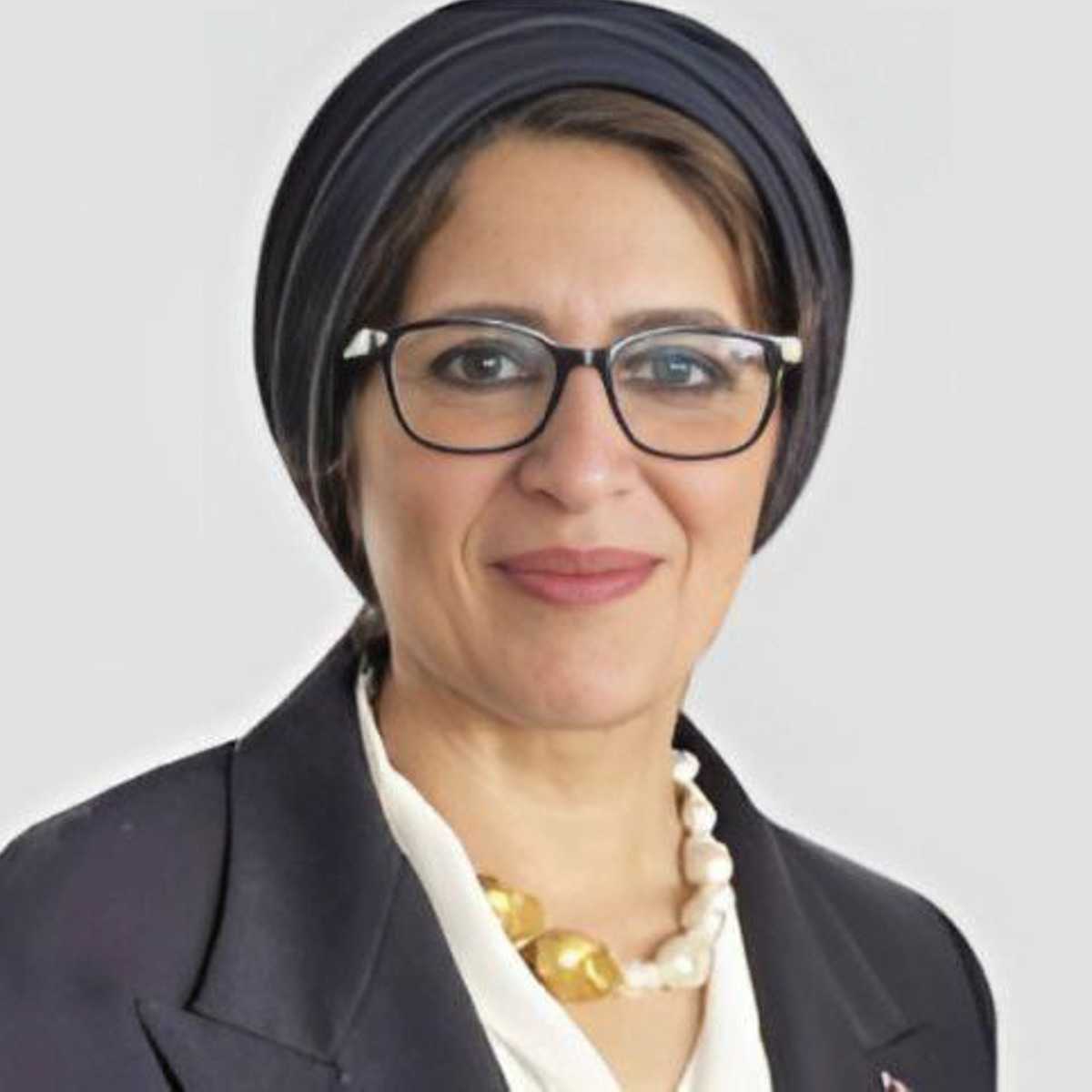

February marks the observance of Black History Month across the United States and APCO’s Black and African Ancestry Movement (BAAM) employee resource group wanted to take the opportunity to collect the thoughts and experiences of Black employees across the region.
Each year, the Association for the Study of African American Life (ASALH) chooses a theme for the month. This year’s theme, “Black Resistance,” explores how Black communities have resisted historic and ongoing oppression in all forms. It also highlights the impact of Black faith institutions, cultural centers and education.
BAAM members reflect on what Black resistance means to them and how our ideas, while poignantly different, may more greatly unite us all.
– Randi Towns and Tyler Hughes, APCO BAAM co-chairs.
“Black resistance to me means not shrinking myself and having the courage to fight for liberation. Showing up as my authentic self and rejecting respectability honors my ancestors, whose sacrifices, love and protection is and always will be enough.” ~ Ayannah Crawley, Senior Consultant, Corporate Communications
“To me, Black resistance means to fully live in my ’Black joy.’ When I choose to shine and find happiness and comfort despite racial challenges, it is resistance in the context of white supremacy. The idea that Black people can be happy, despite trauma and our extensive history of oppression, is Black resistance. Even in the darkest times in our society, Black people still find a way to laugh and love. That is our strength and ’weapon’ of choice. Rather than romanticizing our struggles, our consistent joy and positivity reveal our humanity and need to feel free and safe in our pursuit of happiness.” Trevor Greggs, Associate Consultant, Digital Strategy
“When I think of Black resistance, I think of showing up at work and in my community as my full self. I can be 100% authentically me, in all my intersectional identities and shades, even in the face of judgement or criticism. For so long, Black people have been denied access to so many industries and opportunities and as we inch closer and closer into incorporating and elevating Black and intersectional voices into these areas, it is crucial that Black people are able to own their narratives in their own, unique ways. That is what Black resistance is all about – Black voices and Black experiences taking up space in areas where they have been denied.” – Tyler Hughes, Associate Director, Corporate Communications
“Black resistance means speaking out against inequality or injustice as you see it. Issues should be addressed when having those awkward conversations with anyone, no matter how senior they are. Having these conversations improves the environment for everyone and gives others the confidence to be their true selves in the long run. Many leaders, including Martin Luther King Jr., Malcolm X and Mary White Ovington, put themselves out there making speeches for civil rights at a time when many people wished they would stay quiet and accept the status quo. Their courage and sacrifices inspire me to stand tall, be proud, and leave things better than I found them.” – Marina Brito, Project Assistant, APCO+
“When I think of Black resistance, I think of the ability of a group of people to continue to push for change despite centuries of inequity. From slave rebellions, Civil Rights, Black Power, Black Lives Matter and so many other movements, we continue to fight for our rights to life, joy, peace and prosperity. No matter what we face, we REFUSE to accept injustice.” – Randi Towns, Senior Associate Director, Health Care
“To me Black resistance means showing up authentically as who you are. James Baldwin once said, and I am paraphrasing here, ‘to be Black and conscious in America is to be in a constant state of rage.’ It is a poignant statement with a lot to unpack, but what I would like to focus on is the expression of emotion that Mr. Baldwin is talking about. Being able to express emotion was not always a luxury that the Black community had, and it is still a dangerous thing for Black people to show emotion. So today, we resist by being happy, sad, mad, unbothered, or just whatever. We resist by letting our emotions and personalities just be, because to feel is to be human.” – Andima Umoren, Senior Associate Director, Digital Strategy
“Black resistance is the refusal to accept racial bias and injustice. Traces of our divided history impact the Black experience to this day. When you understand what is being done, there is no more appropriate response than to oppose. No group should feel marginalized or unequipped with the respect they need to afford a quality life and position in society. When we see evidence of this happening, we should call it out and resist.” – Kamila Green, Project Assistant, APCO+
“When I think of Black resistance, I think of the trials and tribulations that Black people have endured for centuries. Despite the countless barriers that were created to destroy and deter us, we still utilize our resiliency to persevere and improve our quality of life. Black resistance is personified by people being vocal and actively engaging in all matters pertaining to their well-being and their future—especially within the social and political realms. As Dr. Martin Luther King stated, ‘our lives begin to end the day we become silent about the things that matter.’ Today, we personify Black resistance by utilizing our brilliance to operate in spaces and professions where we typically lack a presence. We show up and enthusiastically support our community in their time of need. Lastly, Black resistance is enduring what is necessary to create better opportunities for upward mobility for the next generation.” – Demetrius Deloatch, Senior Consultant, Public Affairs
“To me, Black resistance is the acknowledgement of the Black experience and the conscious effort to make sure it is known. It is an effort to not be ignorant or oblivious of plight. It is the opposite of silence, and the sister of ill-complacency to this plight of accepting such a world view outside of the Black experience. You do not just sit to accept but engage; to uncomfortably voice the need of understanding. I would rather call it the Black engagement, because it is engaging in something that takes with it the responsibilities of teaching and re-learning what it means to be Black.” – Joshua Nivens, APCO IT
“Joy, peace, rest. Building our own communities and support networks that are not dependent upon or in opposition to white dominant culture.” – Adrienne Gaither, Art Director, APCO Studio
“Black resistance to me means redefining social norms to create more spaces where Black voices and experiences are equally represented. It is feeling the freedom to show up authentically and apologetically and embrace my culture and background.” – Jada Vanderpool, Senior Consultant, Corporate Communications
“Black resistance is ‘exceeding expectations.’ The Black community has always been underestimated. Before we enter a room or utter a word, decisions have been made about our character, capabilities, or knowledge. Knowing that the world is stacked against you and excelling despite it, is powerful. No matter what the challenge the Black community has always risen to the occasion and will continue to do so as our ancestors did before us.” – Taryn Laster-Whitehead, Senior Associate Director, Equity and Justice
“Black resistance is defying the odds. It is the presence of Black success. Amongst countless barriers throughout history implemented to oppress Black People and prevent them from gaining economic mobility, Black wealth is visible beyond what our ancestors previously thought was possible.” – Kennedy Parkins, Project Consultant, APCO+
This piece was co-authored by APCO alumnus Tyler Blackburn.


